|
|
|
Sort Order |
|
|
|
Items / Page
|
|
|
|
|
|
|
| Srl | Item |
| 1 |
ID:
173415
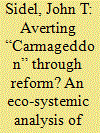

|
|
|
|
|
| Summary/Abstract |
This article provides a holistic analysis of traffic congestion in Metro Manila, treating traffic and transport in the Philippines’ national capital region as an ecosystem which has entrenched itself, endured, and evolved in the face of ongoing demographic, economic, and technological change. The article focuses on the activities and initiatives of a new “species” within Metro Manila’s transport ecosystem – the transport reform advocacy group – to identify and examine both the constituent elements and complex operations of the ecosystem and its capacities for resistance, resilience, and reconstitution in the face of reforms. These reform initiatives include a proposed bus rapid transit (BRT) system, the loosening of number coding restrictions on public utility vehicles, the liberalization of point-to-point (P2P) bus services, the legalization of motorcycle taxis, the Public Utility Vehicle Modernization Program (PUVMP), the establishment of bicycle lanes, and the expansion and improvement of pedestrian walkways to improve micro-mobility in the metropolis. The article concludes with a consideration of the efforts of transport reform advocacy groups to advance these elements of their reform agenda amidst the ongoing global pandemic and the government-imposed quarantine and economic downturn in the Philippines in early-mid 2020.
|
|
|
|
|
|
|
|
|
|
|
|
|
|
|
|
| 2 |
ID:
184758
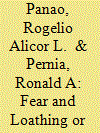

|
|
|
|
|
| Summary/Abstract |
This paper examines speechmaking on a contentious policy by arguably one of the most controversial figures to have assumed the Philippine presidency. Drawing on quantitative textual approaches on a corpus of 845 presidential speeches delivered between June 2016 and July 2020, we provide evidence that Rodrigo Duterte's evocative utterances against drug lords and criminals are not just deliberate illocutionary acts intended to court public support, but also priming tactics aimed towards a politically and economically significant audience whose acquiescence gives symbolic legitimacy to a controversial anti-crime policy. Using quantitative textual approaches and econometric analysis, we find that violent-crime rhetoric is more likely to accompany public pronouncements made before a political audience consisting of law enforcement authorities and government officials, as well as an economic audience made up of business chambers, overseas Filipino workers, and labor groups. Overall, the findings nuance an image of Duterte beyond that of a penal populist.
|
|
|
|
|
|
|
|
|
|
|
|
|
|
|
|
| 3 |
ID:
189050
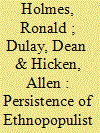

|
|
|
|
|
| Summary/Abstract |
The past few years have seen an emergence of populist leaders around the world, who have not only accrued but also maintained support despite rampant criticism, governance failures, and the ongoing COVID pandemic. The Philippines’ Rodrigo Duterte is the best illustration of this trend, with approval ratings rarely dipping below 80 percent. What explains his high levels of robust public support? We argue that Duterte is an ethnopopulist who uses ethnic appeals in combination with insider vs. outsider rhetoric to garner and maintain public support. Moreover, we argue that ethnic affiliation is a main driver of support for Duterte, and more important than alternative factors such as age, education, gender, or urban vs. rural divides. We provide evidence of Duterte's marriage of ethnic and populist appeals, then evaluate whether ethnicity predicts support for Duterte, using 15 rounds of nationally representative public opinion data. Identifying with a non-Tagalog ethnicity (like Duterte) leads to an 8 percent increase in approval for Duterte, significantly larger than any other explanatory factor. Among Duterte supporters, a non-Tagalog ethnicity is associated with 19 percent increase in strong versus mild support. Ethnicity is the only positive and significant result, suggesting that it strongly explains why Duterte's support remains robust. Alternative explanations, such as social desirability bias and alternative policy considerations, do not explain our results.
|
|
|
|
|
|
|
|
|
|
|
|
|
|
|
|
| 4 |
ID:
160404
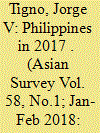

|
|
|
|
|
| Summary/Abstract |
Amid the bluster of Philippines President Rodrigo Duterte over the past year, a clearer picture emerged in 2017 of the leader and the direction he wants the country to take. Duterte may be a popular shaker and change-maker, but for the most part, he has also proven to be a divisive president.
|
|
|
|
|
|
|
|
|
|
|
|
|
|
|
|
| 5 |
ID:
164960
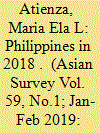

|
|
|
|
|
| Summary/Abstract |
Two and a half years into the Duterte administration, the country is facing high inflation rates, weak political institutions, and political uncertainty. While there are efforts toward political reform as well as peaceful settlement of conflicts, the country remains divided, with no clear strategy for reforms or nation-building being offered.
|
|
|
|
|
|
|
|
|
|
|
|
|
|
|
|
| 6 |
ID:
172470
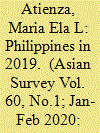

|
|
|
|
|
| Summary/Abstract |
The Duterte administration has facilitated a new autonomous arrangement in Muslim Mindanao, and congressional allies passed some popular laws. In the midterms, Duterte-backed candidates dominated both national and local elections. However, the promised charter change has floundered, economic growth has been tempered, and the drug war has not succeeded.
|
|
|
|
|
|
|
|
|
|
|
|
|
|
|
|
| 7 |
ID:
179251
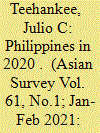

|
|
|
|
|
| Summary/Abstract |
The outbreak of the COVID-19 pandemic initially threatened the populist legacy of Philippine President Rodrigo R. Duterte. Despite implementing one of the longest and strictest lockdowns globally, the country is still struggling to control the virus. While Duterte appears victorious in his assault on human rights and media freedom, his government’s record in fighting the virus is spotty at best. Yet, Duterte’s populism proved resilient. He remains extremely popular, with a September national survey reporting 81% approval of his government’s response to the pandemic and 91% of respondents expressing trust in his leadership.
|
|
|
|
|
|
|
|
|
|
|
|
|
|
|
|
| 8 |
ID:
185207
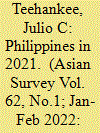

|
|
|
|
|
| Summary/Abstract |
In his last year in office, populist Philippine president Rodrigo Duterte faced the deadly surge of the Delta variant of the COVID-19 pandemic. His government continued to struggle with the health crisis despite implementing one of the most heavy-handed lockdowns in the world. In his final State of the Nation address, he trumpeted his administration’s “war on drugs” and ordered the military to hunt communist insurgents and “shoot them dead.” At the same time, he admitted that he has failed in his “war on corruption,” the second plank in his 2016 campaign platform. His admission foreshadowed the biggest corruption scandal of his administration. The Senate uncovered evidence of financial misuse, particularly for supplies from Pharmally Pharmaceutical, a business formed just months before securing billions of pesos in government supply contracts. The controversy has eroded Duterte’s popularity ratings, but he has retained high enough numbers to leverage political support in the upcoming 2022 presidential election and deflect impending International Criminal Court prosecution for his bloody drug war.
|
|
|
|
|
|
|
|
|
|
|
|
|
|
|
|
| 9 |
ID:
177616
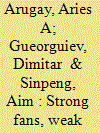

|
|
|
|
|
| Summary/Abstract |
The 2016 presidential contest is widely considered as the first “social media election” in the Philippines. At the same time, it remains unclear if or how social media helped Rodrigo Duterte mobilize voters to gain victory. There are three main social media campaigning models: broadcast, grassroots, and self-actualizing. Analysis of twenty million activities and 39,942 randomly sampled comments across the official Facebook pages of key presidential candidates supports the grassroots model as Duterte's profile was the most engaged, even if Duterte himself was not actively engaged. Such inconsistencies raise the prospect that Duterte's online prominance was fabricated by paid trolls and fake accounts. Instead, our analysis suggests that Duterte's digital fanbase was, at least in part, a reflection of offline, grassroots political support. In particular, data from an original survey of 621 respondents suggests that Duterte supporters were not only aggressive in their support for Duterte online, they were also more committed to him offline as well. These findings add to a growing literature on social media and politics that seeks to understand the broader ecosystem of online political discourse, rather than focusing on the actions and strategies of political campaigns. They also underscore the fine line between fabricated support and genuine political fervor.
|
|
|
|
|
|
|
|
|
|
|
|
|
|
|
|
| 10 |
ID:
187735
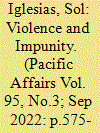

|
|
|
|
|
| Summary/Abstract |
As president from 2016 to 2022, Rodrigo Duterte captured the judiciary, dominated the legislature, attacked the media, and presided over a campaign of mass killing, leaving an estimated 30,000 alleged drug criminals dead. Despite wielding vast amounts of power, Duterte stepped down after the national elections on May 9, 2022 in a largely peaceful transfer of power to Ferdinand Marcos Jr., son and namesake of the former dictator deposed in 1986. Why did Duterte amass power without causing full democratic collapse into authoritarian rule? The Philippines experienced backsliding to competitive authoritarianism: while elections remain free and somewhat fair, other features of democracy like civil liberties and political freedoms have eroded badly because of mass violence. The Philippine case demonstrates the autocratizing effect of an emerging form of political violence: a focused campaign of state terror that produces fear and electoral success. I present evidence from two cases—the national “war on drugs” and its local antecedent in Davao City—to explain how violence escalates, provokes accountability, evades culpability, and contributes to democratic backsliding without immediate collapse to authoritarianism. With the election of Marcos Jr., the impunity of the former incumbent is likely to become institutionalized, and democratic backsliding is unlikely to be reversed.
|
|
|
|
|
|
|
|
|
|
|
|
|
|
|
|
|
|
|
|
|